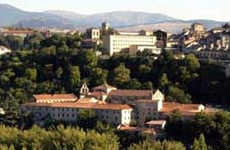|
|
|
|
|
| | | | |
| | | | | | |
| TNT 2004 "Trends in Nanotechnology" |
La5 Abril, 2019nero, 2007
|
| Segovia, Spain | From 2004-09-13 to 2004-09-17 |
 
| |
TNT04 |
What's New |
TNT04 |
|
 TNT Next edition will take place in Oviedo (Spain): August 29-September 02, 2005 and the related website will be available at http://www.tnt2005.org/ TNT Next edition will take place in Oviedo (Spain): August 29-September 02, 2005 and the related website will be available at http://www.tnt2005.org/
|
|
|
| |
 Organisers Organisers
















 Sponsors Sponsors



















 Media
Sponsors Media
Sponsors


 Exhibitors Exhibitors







|
| The
rapidly emerging areas of nanoscale science and technology
are focussed on the design, fabrication, and characterization
of functional objects having dimensions at the nanometer length
scale. New advances in this emerging area are expected to
have long range implications in a wide variety of different
scientific and engineering disciplines. The importance of
nanoscale science is growing worldwide and it is now widely
recognized as a critical component to the future growth of
the world economy. |
| |
| In
response to the growing awareness of the importance of nanotechnology,
many conferences are being organized worldwide to discuss
the latest advances. Among those, the series of conferences
"Trends in Nanotechnology" (Toledo-Spain, 2000 / Segovia-Spain,
2001 / Santiago de Compostela-Spain, 2002 / Salamanca-Spain,
2003) has become a key meeting in the nanotechnology field
since it brings fresh ideas on organisation, first level speakers,
and an environment suitable to keep discussions, ideas exchange
and enhance scientific and personal relations among participants.
TNT2004 is being held in large part due to the overwhelming
success of earlier Nanotechnology Conferences, TNT2000,
TNT2001, TNT2002
and TNT2003.
TNT2004 will be organized in a similar way to the four
prior TNT conferences. In 2003, this five day conference
attracted around 350 scientists worldwide and featured ~70
talks ranging from 15 minutes to 30 minutes. Approximately
200 posters were presented. |
| |
| The aim of the "Trends
in Nanotechnology" conference (TNT2004) will be
to focus on the applications of Nanotechnology and to bring
together in a scientific Forum various groups throughout the
world working in this field. |
| |
| A characteristic
feature of this conference is the large number of students
presenting their results at poster sessions. No parallel sessions
are hold at TNT and this structure provided such as last years
an opportunity for broad interaction. The TNT presentations
are categorised in the following major topics: |
| |
- Nanofabrication
- Measurements/characterization at the nanoscale
- Carbon nanotubes
- Quantum dots and wires/Electron transport phenomena
- Bio-nanotechnology
- Nanomagnetics/spintronics
- Nanomechanics, e.g nanotribology, nanofluidics etc
- New quantum phenomena, e.g. quantum computing
- Modeling at nanoscale
|
|
During this event, specific sessions on topics of interest
will be organised with Research labs or Institutions such
as iNANO (Denmark), NIMS (Japan) or IEEE (USA). The half-day TNT04/IEEE session will focus on standards
development impact on the commercialisation of Nanotechnology
based products. Keynote speakers will detail ongoing standards
efforts and future standards needs in the areas of nanoelectronics
and nanomaterials. Standards challenges and opportunities
to be addressed by speakers include:
- Nanoscale materials characterization and metrology
- Nanoscale device fabrication and manufacturing technologies
- Test and measurement tools
- Nanoelectronics reliability and performance
- Interoperability environments of hybrid systems
- Health and environmental issues
- Roadmap for nanotechnology standards
A concluding panel session will focus on the topic "Standards
and Nanotechnology - What is needed, Who Benefits, What
are the Risks?" The panel session will include an interactive
"question and answer" period.
|
| |
|
Keynotes (to be completed)
|
- Masakasu Aono (Nanomaterials Lab. NIMS, Japan)
- Jean-Philippe Bourgoin (CEA/Saclay, France)
- Juergen Brugger (EPFL, Switzerland)
- Enrique Calleja (UPM, Spain)
- Federico Capasso (Harvard University, USA)
- Hai-Ping Cheng (University of Florida, USA)
- Mei-Yin Chou (Georgia Institute of Technology, USA)
- Ken Dean (Motorola, USA)
- Georg S. Düsberg (Infineon Technologies AG, Germany)
- Andreas Engel (University of Basel, Switzerland)
- Albert Fert (CNRS/THALES, France)
- F. Javier Garcia de Abajo (CSIC-UPV/EHU, Spain)
- Peter Gruetter (McGill University, Canada)
- L. Jay Guo (University of Michigan, USA )
- Tomihiro Hashizume (Hitachi Advanced Research Lab., Japan)
- Anwar Hasmy (IVIC, Venezuela)
- Andy Henson (International Office of the National Physical Laboratory, UK)
- Christian Joachim (CEMES/CNRS, France)
- Krishna Kalyanasundara (Motorola, USA)
- Phil Kuekes (Hewlett-Packard, USA)
- Young Kuk (Seoul National University, Korea)
- Gerhard Meyer (IBM, Swtzerland)
- Mervyn Miles (University of Bristol, UK)
- Eiichi Nakamura (The University of Tokyo, Japan)
- Roberto Otero (iNANO, Denmark)
- Danny Porath (Hebrew University, Israel)
- Edward Rashba (IEEE, USA)
- Mathis Riehle (University of Glasgow, UK)
- Stephan Roche (CEA-DRFMC, France)
- Frank Scheffold (University of Fribourg, Switzerland)
- Ivan K. Schuller (UCSD, USA)
- Alexander Shluger (University College London, UK)
- Robert Shull (NIST, USA)
- Clivia Sotomayor (NMRC, Ireland)
- Joachim P. Spatz (University of Heidelberg , Germany)
- Erio Tossati (SISSA, Italy)
- John Tucker (Keithly instruments, USA)
- Masaru Tsukada (Waseda University, Japan)
- Daniel Ugarte (Lab. Nacional de la Luz Síncrotron, Brazil)
- Patrick Van Hove (EU IST/FET, Belgium)
- Mark Welland (Cambridge University-IRC, UK)
- Stuart Wolf (DARPA, USA)
- Noboru Yamazaki (NRI /AIST, Japan)
- Constantine Yannouleas (Georgia Institute of Technology, USA)
- Hiroshi Yokoyama (AIST, Japan)
|
|
Conference Location:
|
Universidad SEK-Segovia
Campus de Santa Cruz de la Real
C/Cardenal Zúñiga, 12
40003 Segovia, Spain
|
|
Date:
|
13-17 September, 2004
|

|
Further details:
|
Antonio
Correia
Fundacion PHANTOMS
PCM-UAM, Ctra. Colmenar Viejo Km 15
Campus de Cantoblanco, 28049 Madrid
Spain
|
|
|
| | |
| | | | | | | | | |
|
|
|
|
|
|
|
© Phantoms Foundation 2025 |
|